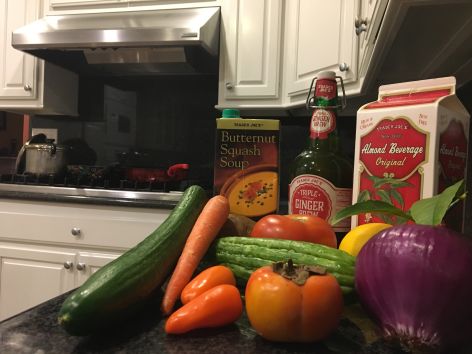
“What is your favorite food?”
A common question asked as an icebreaker.
“Why is it your favorite food?”
A bit less common.
Most people know what their favorite foods are or at least the flavors they enjoy. However, a lot of people don’t fully understand why something tastes so good and even more so, the rising topic of GMOs, or genetically modified organisms, that are responsible for it.
Sophomore Caleb Ahn said, “Most people don’t really understand or care much about them because they haven’t seemed to evolve enough to make a major impact on people’s lives.”
However, many, such as Ahn, aren’t fully aware that most common foods nowadays are chemically processed. An estimated 80 percent are chemically processed with at least one GMO.
GMOs are organisms whose genetic material has been altered through means of chemical or genetic engineering. It is the modification of an organism’s phenotype by altering its genetic makeup in order to introduce a new trait to the species.
Tina Smith, director of Carlmont’s biotech department, said, “When you think of a strawberry, you think of something plump and sweet. That’s the work of GMOs. In reality, a wild strawberry that hasn’t had it’s DNA modified is tiny and sour.”
Critics like Occupy Monsanto say consumers do not know of any potential health complications which may arise when eating foods rich in GMOs.
Sophomore Rishabh Kokal said, “I am personally against GMOs. They are unhealthy and are also bad for the environment by harming the animals the might eat the crops. That’s what I’ve heard and what I’ve been taught.”
And some companies are reacting.
Whole Foods will soon require labels on all GMOs in its stores while Trader Joe’s and Chipotle have sworn off GMOs.
“When shopping or going out to eat, I see stickers that say “GMO-free” or “NO GMOs” all over the place. It helps reassure and comfort buyers that what they are purchasing is safe and healthy,” Kokal said.
Some environmentalists and public interest groups want to go further. Hundreds of organizations, including Consumers Union, Friends of the Earth, Physicians for Social Responsibility, the Center for Food Safety, and the Union of Concerned Scientists, are demanding “mandatory labeling of genetically engineered foods.” Since 2013, Vermont, Maine, and Connecticut have passed laws to require GMO labels.
According to a poll conducted by the Pew Research Center, 57 percent of all Americans believe that GMOs are unhealthy or unsafe to eat. Contrastingly, 88 percent of scientists say that they are safe and pose no threat to health.
“There’s definitely no need to avoid GMOs. I personally don’t. The FDA has some pretty intense inspection. So when genetically modified foods have gotten FDA approval, they are certainly safe to eat,” Smith says.
In addition, scientific organizations such as the American Medical Association, the World Health Organization, and the National Academy of Sciences all say hundreds of peer-reviewed studies confirm GMOs pose no danger to health.
Biotechnology and the development of GMOs have created more resilient crop varieties that are better able to survive the changing conditions of global warming. The GMOs under development today, along with improved conventional farming methods and new biologic crop protection products, have also decreased the number of insecticides and is currently working towards fixing widespread hunger.
Sophomore Marco Brocchieri said, “I suppose GMOs are good because they can feed the masses. They can also lead to prolonged food life of certain crops or the crops staying clean of bugs.”
Dr. Pam Ronald, a plant geneticist at the UC Davis, points out that farmers have already been genetically altering food for thousands of years, using techniques like grafting, hybridization, and crossbreeding. For example, modern sweet corn produces a hundredfold more grain than its ancient ancestor, which is not used anymore.
It’s only in the past decade when GMO awareness began to rise, mostly with a negative connotation due to many health experts believing the insertion of foreign DNA leads to contamination and unnatural reproduction.
“I believe the general public isn’t educated well enough about GMOs. Also, in order to be educated, it’s important to get all sides rather than leaning towards false advertisement or exaggeration,” said sophomore Joshua Mathews.
For now, the best approach is one of education and information, which will allow one to contribute to a safer and more positive future of genetically modified foods. It’s important to stay informed of both sides of the argument and wait to see what the future has in store.
Smith said, “There’s been much more advancement in biotechnology over the past few years. As someone who is witnessing constant development and change, it’s better to stay a well-informed consumer so you can draw your own conclusions.”












